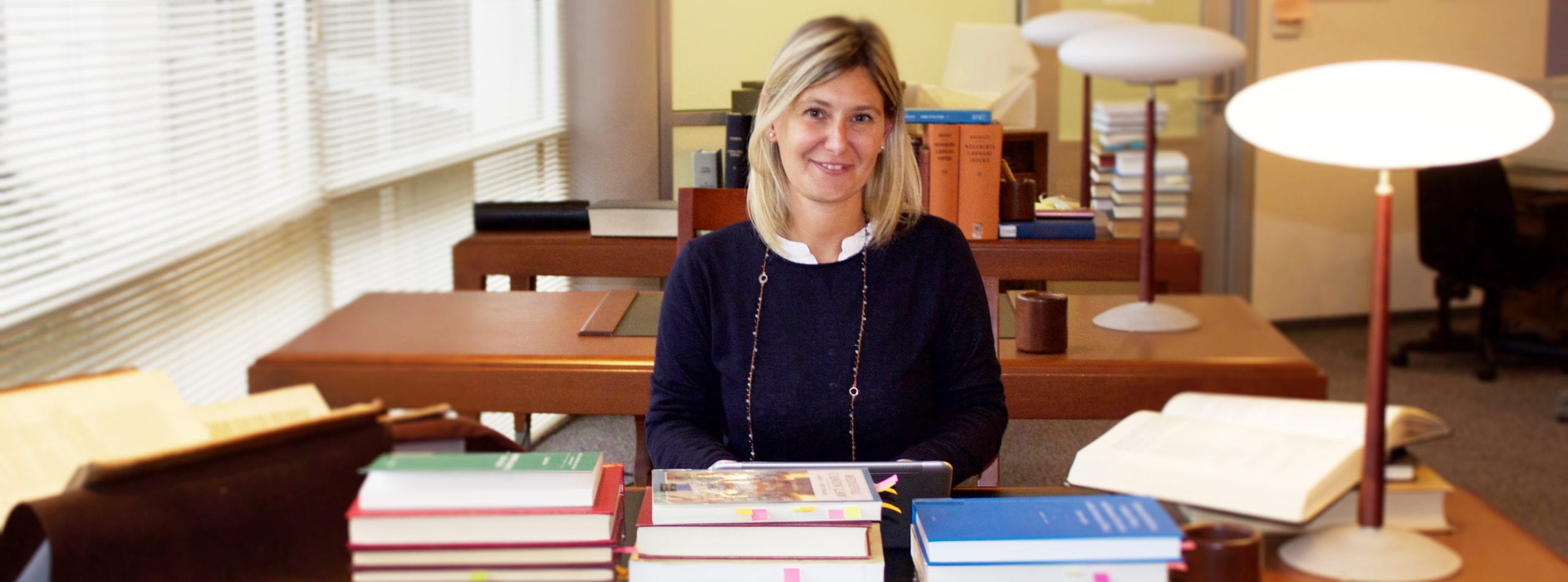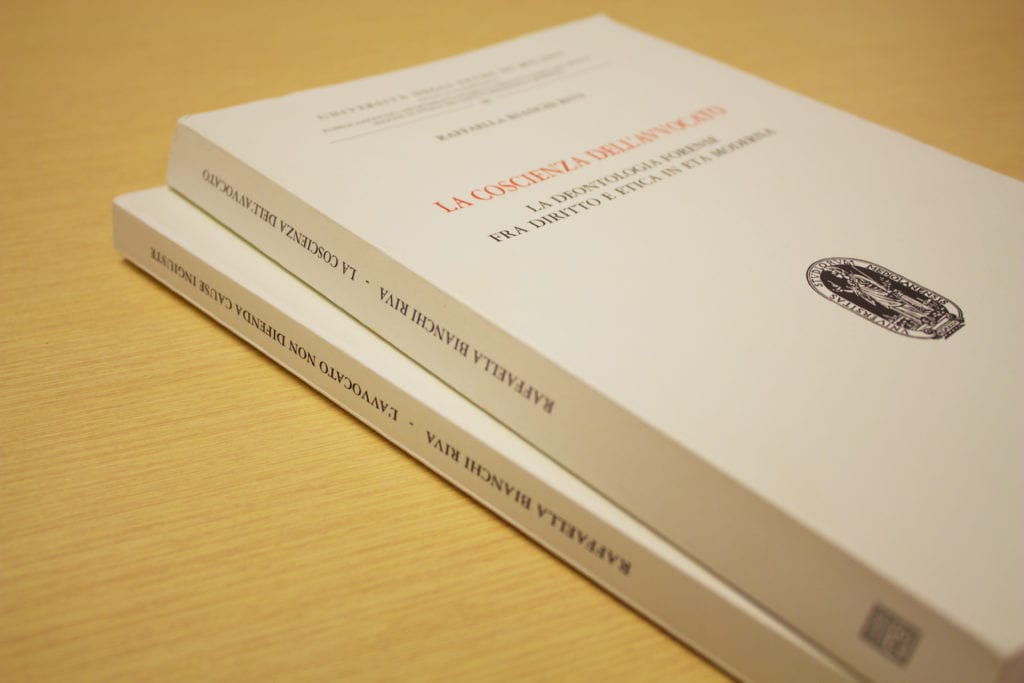
From the summer through the fall of 2017, the Robbins Collection welcomed three visiting scholars as part of its fellowship program. Rounding out the trio is Raffaella Bianchi Riva, an Italian academic who visited Berkeley Law from September until late November to continue her research on the legal effects of scandal in the Middle Ages. Dr. Bianchi Riva resides in the lakefront city of Como and works at the University of Milan as an Assistant Professor. She currently teaches courses on the history of the legal profession in the university’s department of Italian and supranational law.
Her first research focus was the legal profession—legal ethics in the middle and early Modern Age, in particular. Dr. Bianchi Riva’s study of legal ethics has roots in the first official Code of Conduct for Italian Lawyers, which was approved by Italy’s National Bar Council in 1997. The debates about the regulation of professional ethical conduct brought a question to Dr. Bianchi Riva’s mind that would germinate into much of her research: “Are legal ethics—the rules, the duties—ethical and moral, or legal?” Since then, Dr. Bianchi Riva has studied how professional legal ethics were historically shaped into a deontological model, one which emphasizes the relationship between duty and the moral obligation of an action, regardless of the consequential end.
Dr. Bianchi Riva received her PhD in the history of institutional doctrines from Como’s University of Insubria in 2009. Her thesis focused on the conception and development of ethics for the legal profession, particularly in the Middle Ages. Dr. Bianchi Riva traced the two-fold moral obligation that a lawyer is morally bound to both the judicial system and the client back to its roots in jurisprudence and moral theology of the Middle Ages. In studying the historical doctrines of canon law, civil law, common law, and moral theology, Dr. Bianchi Riva compared the evolving distinctions between professional conduct and ethical duty.

The research Dr. Bianchi Riva completed for her thesis eventually evolved into the subject matter of her first book: L’Avvocato Non Difenda Cause Ingiuste: Ricerche sulla deontologia forense in eta medievale e moderna (Giuffre, 2012). When speaking on the topic of deontology in the legal context, Dr. Bianchi Riva emphasizes the “continuous balance [of] different values” as a constant moral task for the lawyer. She says, “For instance, from one end there is the duty of confidentiality [to the client], and from the other end there is the duty to truth and honesty. The difficult work is for the lawyer to balance out these different values.” This is indeed the case as article one of the Code of Conduct for Italian Lawyers articulates the lawyer’s ethical duty to the Constitution, the regulations of the European Union, and to “human rights and fundamental freedoms…for the protection and in the interest of the assisted party.” (National Bar Council 2014).
When asked how moral absolutes fit into the history of legal ethics—such as who or what entity has the authority to define the ethical boundaries for lawyers to adhere to—Dr. Bianchi Riva responded: “I could answer that with the title of my book.” Dr. Bianchi Riva’s second published book is titled, La Coscienza Dell’Avvocato: La deontologia forense fra diritto e etica in eta moderna (Giuffre, 2015) . The work examines the process of compiling professional rules in the modern age. Unlike the Middle Ages, the modern age saw a growing distinction between moral and legal consequences for lawyers who found themselves in violation of professional rules. Dr. Bianchi Riva’s study of the modern age highlights the constant importance of a lawyer’s conscience in guiding their professional decisions, a concept which still lingers in the profession today.

Never having ventured to California before, Dr. Bianchi Riva took a chance on a new experience with the Robbins Collection fellowship. Among her legal historian colleagues, she’d heard positive comments regarding the fellowship. She’d travelled to the United States as a tourist, but never to the Berkeley campus, until she decided to experience the program first-hand. She says, “now I can confirm it is a wonderful experience.”
The change in location is not the only thing Dr. Bianchi Riva has altered in her academic endeavors, her research focus shifted recently as well. Dr. Bianchi Riva has been researching legal effects of scandal throughout the Middle Ages, “in the broader context of the relationship between law and society from one end, and law and ethics from the other.” She hopes by comparatively studying texts from the early and late medieval period she can provide “an overall view of the legal history of scandal.” Through her comparative research, Dr. Bianchi Riva is uncovering the shifting tides of accepted values, customs, and habits of institutions and individuals of the past.
In some cases, a look back at historical scandals reveals the renunciation of certain laws in order to prevent social reactions. Dr. Bianchi Riva clarified: “Scandals arose and still rise when people cry that a situation has gone against their values and habits. In medieval canon law, legal rules could be waived in order to avoid scandal. So a lawful act could be prohibited, or on the contrary, an offense could be tolerated depending on the timing of the scandal.” She says, “a lot of cases of scandal regarded customs and it is obvious because scandal regards widespread values, habits—and the same goes for custom.” Though she considers the topic to be a move away from her study of professional legal ethics, Dr. Bianchi Riva finds an interconnection between the two subjects in their relation to personal and institutional values.
Dr. Bianchi Riva’s comparative approach is useful in considering that scandal has never had a singular, time-tested, definition: “What we consider scandal today is different. In the early and late medieval period there was a broad consideration of scandal, it had a broad meaning [that included any form of discord or dissent].” Speaking on the goals of her latest research, she says, “after focusing on medieval canon law, I can compare the results of canon law with other medieval systems in the early and late middle ages to open up the research about canon law [in comparison] to other legal systems.” After her fellowship at the Robbins Collection comes to a close, Dr. Bianchi Riva will return to Italy, where she will continue her research and teaching.
Learn more about the Robbins Collection titles and subjects Raffaella is implementing for her research:
| AUTHOR | TITLE | YEAR | CALL NO. | SUBJECTS | |
| 1. | Karl Gottschlich | Dispensatio in lege et leges dispensationum… | 1752 | Robbins Rare BQV192.A2 G68 | |
| 2. | Troy L. Harris, ed. | Studies in Canon Law and Common Law in Honor of R.H. Helmholz | 2015 | Stacks K561 .S7884 2015 |
Photos of Raffaella Bianchi Riva: Sohayla Farman
01/29/18